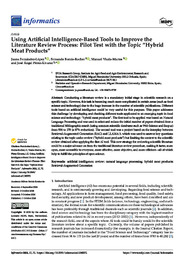Por favor, use este identificador para citar o enlazar este ítem:
https://hdl.handle.net/11000/35014Registro completo de metadatos
| Campo DC | Valor | Lengua/Idioma |
|---|---|---|
| dc.contributor.author | Fernandez-Lopez, Juana | - |
| dc.contributor.author | Borras Rocher, Fernando | - |
| dc.contributor.author | Viuda-Martos, Manuel | - |
| dc.contributor.author | Pérez-Alvarez, José Angel | - |
| dc.contributor.other | Departamentos de la UMH::Tecnología Agroalimentaria | es_ES |
| dc.date.accessioned | 2025-01-20T10:39:59Z | - |
| dc.date.available | 2025-01-20T10:39:59Z | - |
| dc.date.created | 2024-10-05 | - |
| dc.identifier.citation | Informatics 2024, 11(4), 72 | es_ES |
| dc.identifier.issn | 2227-9709 | - |
| dc.identifier.uri | https://hdl.handle.net/11000/35014 | - |
| dc.description.abstract | Conducting a literature review is a mandatory initial stage in scientific research on a specific topic. However, this task is becoming much more complicated in certain areas (such as food science and technology) due to the huge increase in the number of scientific publications. Different tools based on artificial intelligence could be very useful for this purpose. This paper addresses this challenge by developing and checking different tools applicated to an emerging topic in food science and technology: “hybrid meat products”. The first tool to be applied was based on Natural Language Processing and was used to select and reduce the initial number of papers obtained from a traditional bibliographic search (using common scientific databases such as Web Science and Scopus) from 938 to 178 (a 87% reduction). The second tool was a project based on the interplay between Retrieval-Augmented Generation (RAG) and LLAMA 3, which was used to answer key questions relating to the topic under review (“hybrid meat products”) but limiting the context to the scientific review obtained after applying the first AI tool. This new strategy for reviewing scientific literature could be a major advance on from the traditional literature review procedure, making it faster, more open, more accessible to everyone, more effective, more objective, and more efficient—all of which help to fulfill the principles of open science | es_ES |
| dc.format | application/pdf | es_ES |
| dc.format.extent | 20 | es_ES |
| dc.language.iso | eng | es_ES |
| dc.publisher | MDPI | es_ES |
| dc.rights | info:eu-repo/semantics/openAccess | es_ES |
| dc.rights | Attribution-NonCommercial-NoDerivatives 4.0 Internacional | * |
| dc.rights.uri | http://creativecommons.org/licenses/by-nc-nd/4.0/ | * |
| dc.subject | Artificial intelligence | es_ES |
| dc.subject | Review | es_ES |
| dc.subject | Natural language processing | es_ES |
| dc.subject | Hybrid meat products | es_ES |
| dc.subject | Retrieval-Augmented Generation | es_ES |
| dc.title | Using Artificial Intelligence-Based Tools to Improve the Literature Review Process: Pilot Test with the Topic “Hybrid Meat Products” | es_ES |
| dc.type | info:eu-repo/semantics/article | es_ES |
| dc.relation.publisherversion | https://doi.org/10.3390/informatics11040072 | es_ES |

Ver/Abrir:
Using Artificial Intelligence-Based Too...pdf
2,71 MB
Adobe PDF
Compartir:
 La licencia se describe como: Atribución-NonComercial-NoDerivada 4.0 Internacional.
La licencia se describe como: Atribución-NonComercial-NoDerivada 4.0 Internacional.
.png)